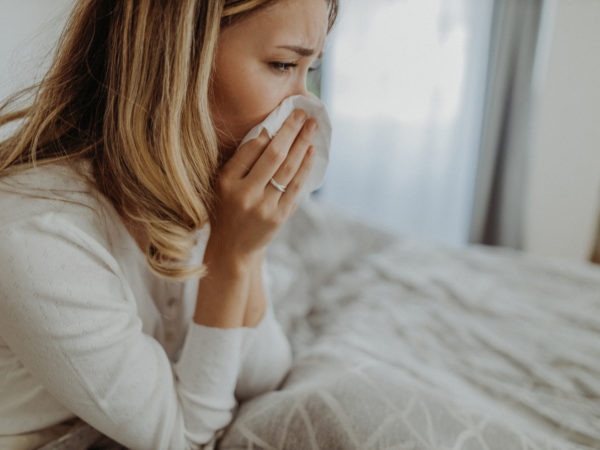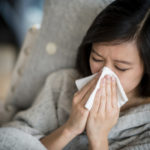5 Tips for Better Sleep When You Have Allergies

Do you often find that your allergies keep you from getting a good night’s sleep? If so, you’re not alone. About 50 million people in the U.S. routinely suffer from allergies that can make it difficult to sleep through the night. And that can greatly impact your overall health and well-being.
Fortunately, there are some simple steps you can take to help you sleep better when allergies flare up. In this post, I’ll share five tips that may make a significant difference in helping you get the sleep you need to feel your best.
1. Opt for Natural Bedding
Consider investing in high-quality natural or hypoallergenic bedding. Unlike bedding made from synthetic materials, such as nylon and polyester, which can be abrasive to sensitive skin and make allergy symptoms worse, natural bedding is softer and more soothing on sensitive skin. To help make the switch from synthetic bedding to a natural option easier, look for bedding made from hypoallergenic, 100% natural materials like cotton, hemp, linen, and kapok.
Certain types of wool – Merino wool, for example – are also known to have hypoallergenic properties and are extra gentle on sensitive skin. You can find Merino wool in everything from pillow and mattress protectors to other top-of-bed items like pillows and comforters.
2. Keep Your Bedroom Clean and Dust-Free
Another essential step to creating an environment that makes it easier to sleep is to keep your bedroom as clean and dust-free as possible. While dusting regularly, vacuuming, and washing your bedding regularly are all common chores that will help keep dust and dirt from settling, another thing to consider is introducing an air purifier to keep the air in your home as clear as possible.
3. Manage Your Allergies
If you suffer from allergies, it’s important to manage them as best you can. This may mean taking medication, using nasal sprays, eye drops, or herbal and supplement remedies recommended by your doctor. The goal is to minimize your symptoms and ensure that you’re as comfortable as possible. If you’re unsure about how to manage your allergies, seek counsel from a local integrative or natural medicine practitioner who can help you find the best options via lifestyle, supplemental or pharmaceutical.
4. Avoid Certain Foods Before Bedtime
Some foods can make allergies worse, impacting your sleep quality. Dairy, wheat, and sugar are known to increase inflammation in the body, which can exacerbate allergy symptoms if eaten too often or too close to bedtime. To find out which foods may be affecting your ability to sleep well, ask your doctor to help you determine what foods you should avoid or take the common ones above and give a 3 to 4 week elimination diet a trial while monitoring symptoms.
5. Consider Using Essential Oils
Certain essential oils can be very helpful in reducing allergy symptoms and promoting better sleep. Organic lavender oil, for example, is known for its calming properties and can help you relax before bedtime. For more information on essential oils and their benefits, see my Guide to Essential Oils here.
Today’s Health Topics
Editor's Pick
Health Focus
Ask Dr. Weil's Q&A
| Join The Fun On Tik Tok! |
| Find Looking for fun health and wellness tips from Dr. Weil! Also get a glimpse into his daily life, his Rhodesian Ridgeback dogs, his garden, and his wellness travels? Follow along on Tik Tok today! and see what he's up to! You can also find him on Instagram, Facebook and Twitter. |
| Join The Tik Tok Fun! |










